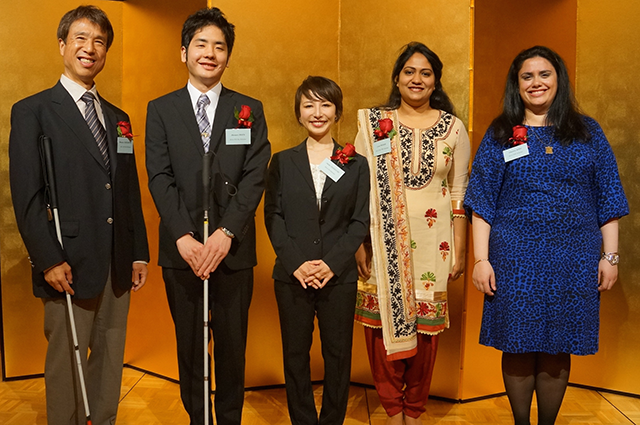Social gatherings while working towards a common goal of charitable fundraising seems like a win-win for all. And little sounds more fulfilling than having to chance to nurture education through scholarships like the College Women’s Association of Japan offers.
By Sami Kawahara
“Enriching, Encouraging, and Educating” is the motto of the 65-year-old nonprofit organization that provides opportunities for students of all walks of life.
Founded after WWII to help cover the the prohibitively large transportation costs for Japanese students to study abroad in the US, the CWAJ has expanded into multiple scholarships offered in four different categories.
Along with the cultural programs, monthly luncheons at the Tokyo American Club, and special interest groups including hiking and book clubs, the 500 members of the CWAJ put on their biggest event in October in the form of a print show exhibition. This annual event is CWAJ’s main source of scholarship funds in addition to donations by both families and companies.
This year’s scholars were announced at the May luncheon, after an application and then a selection process that lasts over the course of several months. Applicants come from many different countries and backgrounds, as scholarships are awarded to a wide range of students: Japanese women graduate students looking to study abroad, non-Japanese women graduate students studying in Japan, visually impaired students, and the newly established Fukushima relief scholarship.
The members select recipients they believe will contribute to a better world through their leadership skills and higher education. This year, the two recipients of the Fukushima Relief Scholarship, for nursing students who were adversely affected by the disaster, were Sonoko Nagasawa and Sayaka Takahashi. Both FRS scholars are focusing on providing support for those who have suffered psychologically during disasters, as well as providing healthcare with a special focus on working women.
A 1.5 million yen was granted to the recipients of the Scholarship for the Visually Impaired. Shotaro Iwata, the first recipient, not only plays the piano and has composed his own songs and music since he was 10, he also studies organic chemistry and plans to graduate with a PhD. Iwata says, “I think organic chemistry has the possibility to change the world. I want to become a chemist and play an active part all over the world, and I want to encourage handicapped people to study organic chemistry.”
Masaya Nakamura, a former high school teacher, is studying for his doctorate and plans to become a university professor. He spends his free time running marathons, having completed more than 50 of them in his lifetime.
The Scholarship for Non-Japanese Women to Study in Japan was awarded to Ghamra Rifai from Syria. “When I came to Japan, a revolution started in my home country and has turned into a very horrible thing. But through horrible things you find many good things. I realized that by helping one human being [you are] helping the whole [of] humanity.” This led Rifai to research the development of artificial skin substitutes from leftover hair at beauty salons. Luna Wahab, the second recipient, is researching functions of the cerebral cortex. And finally, the Scholarship for Japanese Women to Study Abroad was awarded to Akiko Takeuchi, who will study public health at Columbia University and utilize her experience in the Middle East to work on political and social reform with a focus on women.
One way to support CWAJ’s scholarship efforts is by attending the CWAJ Print Show in October. And if you would like to get involved with the organization, visit CWAJ’s site.









